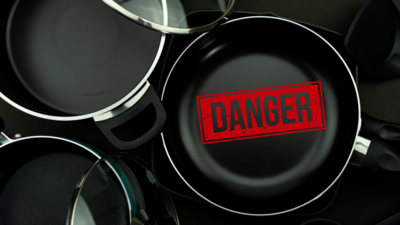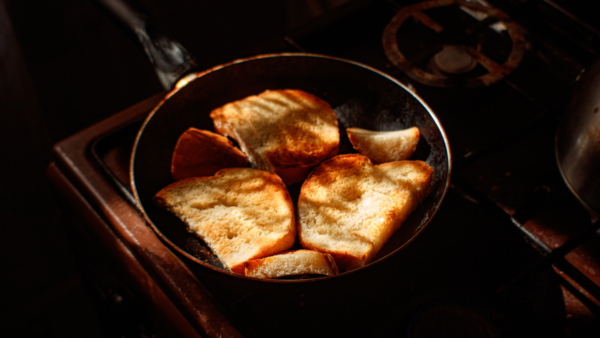
In modern kitchens, non-stick cookware and plastic utensils have become staples due to their convenience and ease of use. However, growing evidence suggests that overheating these items can release harmful chemicals, potentially increasing cancer risk. Non-stick cookware — especially those coated with
Teflon
(polytetrafluoroethylene or
PTFE
) — can pose health risks and has potential links to development of cancer. While these tools are designed to simplify cooking, improper use—particularly exposing them to high temperatures—may pose significant health hazards. Understanding the science behind these risks and adopting safer practices can help mitigate potential dangers.
Can non-stick utensils cause cancer?
According to Dr. Vijay Ramanan, Senior Consultant Clinical Hematologist, Bone Marrow and
Stem Cell Transplant
,
Ruby Hall Clinic
, “Non-stick cookware, such as pans coated with polytetrafluoroethylene (PTFE), commonly known as Teflon, is prized for its ability to prevent food from sticking and reduce the need for oil. PTFE is generally stable and safe at typical cooking temperatures, below 260°C (500°F). However, when overheated—such as leaving an empty pan on a high flame or using it in an oven set above its recommended limit—the coating begins to break down. This degradation releases toxic fumes, including perfluorooctanoic acid (PFOA), a chemical historically used in the production of PTFE. Although
PFOA
has been phased out in many countries since 2015, older cookware may still contain traces of it. Studies, including those by the
International Agency for Research on Cancer
(IARC), classify PFOA as "possibly carcinogenic to humans" due to its links to kidney and testicular cancers in animal studies and human epidemiological data.”
If overheated (above 500–600°F / 260–316°C), the the non stick cookware cancer release toxic fumes. Inhalation of these fumes has been associated to flu like symptoms as an immediate effect.
However the cancer concern is related more to PFOA (perfluorooctanoic acid), a chemical historically used in Teflon production:
• PFOA was linked to cancer (kidney and testicular cancer, among others) and other health issues.
• However, since 2013, most major manufacturers have eliminated PFOA from their non-stick coatings due to health concerns.

Modern non-stick pan manufacturers claim that they use non PFOA-free coatings. However, there needs to be general awareness and the old style product might still be available. We will need more research to establish safety of otherwise of these cookware but alternatives like ceramic, stainless steel, or cast iron are definitely safer options for cooking
When PTFE degrades, it also emits ultrafine particles and gases that can be inhaled. These fumes have been shown to cause "polymer fume fever" in humans, a flu-like condition, and can kill pet birds, which are highly sensitive to airborne toxins. While polymer fume fever is temporary, chronic exposure to these breakdown products may have more insidious effects. Research suggests that prolonged inhalation of such compounds could damage DNA or disrupt cellular processes, potentially elevating cancer risk over time. Though direct causation in humans remains under investigation, the precautionary principle urges limiting exposure to these emissions.
Can plastic utensils cause cancer?
Dr. Sachin Trivedi- Director- Medical Oncology – HCG Cancer Centre, Colaba says, “Similarly the link between plastic utensils and cancer is a topic of ongoing research. However we know that some plastic utensils can release chemicals like BPA (bisphenol A), phthalates, or styrene when exposed to heat (like when stirring hot food or microwaving). BPA and phthalates are known endocrine disruptors — they can interfere with hormones Styrene (found in polystyrene, aka
Styrofoam
) is classified as a possible human carcinogen by the International Agency for Research on Cancer.”
When you heat plastic or put acidic foods in it, there can be acceleration of breakdown of plastics, increasing the risk of chemical release. In addition, we know that over time, plastics can break down into microplastics.
Microplastics
and potentially cause chronic inflammatory states that may be linked to cancer.
Plastic utensils, such as spatulas and spoons, present a parallel concern. Many are made from materials like polycarbonate or nylon, which can leach chemicals when heated excessively. Bisphenol A (BPA), a component in some plastics, is a well-known endocrine disruptor linked to breast and prostate cancer in laboratory studies. While many manufacturers now produce "BPA-free" products, substitutes like
Bisphenol S
(BPS) may carry similar risks.
When plastic utensils are used in hot pans or left in boiling liquids, they can melt or degrade, releasing these compounds into food. A 2021 study published in Environmental Science & Technology found that microplastics and chemical leachates from heated plastics could accumulate in the body, potentially contributing to inflammation and cellular stress—both precursors to cancer development.
The cancer connection isn’t definitive but rests on a growing body of circumstantial evidence. Both PFOA and BPA are persistent in the environment (also called forever chemicals) and bioaccumulate in human tissues, meaning even low-level exposure over years could compound risks. Vulnerable populations, such as children or pregnant women, may face heightened susceptibility due to developing systems or hormonal changes.
To reduce risks, use non-stick cookware at medium-to-low heat, never preheat an empty pan, and discard damaged or scratched items. Opt for heat-resistant alternatives like stainless steel or silicone utensils, which withstand higher temperatures without degrading. Ventilate kitchens well when cooking, and avoid using plastic tools in high-heat scenarios. While convenience is valuable, prioritizing safety can protect long-term health from the hidden dangers of overheated cookware and utensils. While both nonstick cookware and plastic untensils have become part of modern life, a very cautious approach while using them is advised in order to reduce risk of developing cancer.
How Lifestyle Choices Can Increase Your Risk of Stomach Cancer












 English (US) ·
English (US) ·